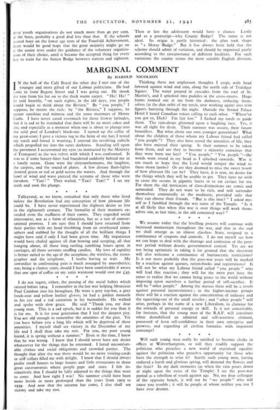I do not regret, either, the passing of the social
habits which existed before 1914. I remember in the last war helping Monsieur Paul Cainbon into his brougham. He wore a grey top-hat, a grey frock-coat and yellow leather gloves; he had a golden monocle in his eye and a red carnation in his buttonhole. He walked and spoke with slow grace. He said "Thank you, my dear young man. This is a sad epoch, but it is sadder for you than it is for me. It is for your generation that I feel the deepest pity. You are old enough to remember the amenities of the past. Yet you have before you a long life which will be deprived of these amenities. I. myself shall see victory in the December of my life and I shall then take my rest. For you, my poor young friend, it is spring without a summer." Even at the time, I knew that he was wrong. I knew that I should never have any desire whatsoever for the things that he esteemed.. I hated uncomfort- able clothes and social obligations and crowded parties. The thought that after the war there would be no more visiting-cards or stiff collars filled me with delight. I knew that I should always prefer small houses to large houses and little restaurants to those great caravanserais where people gape and stare. I felt in- stinctively that I should be fully adjusted to the things that were to come. And how right I was! No summer could have been more lavish or more prolonged than the years from 1919 to 1939. And now that the autumn has come, I also shall see victory and take my rest.


























 Previous page
Previous page